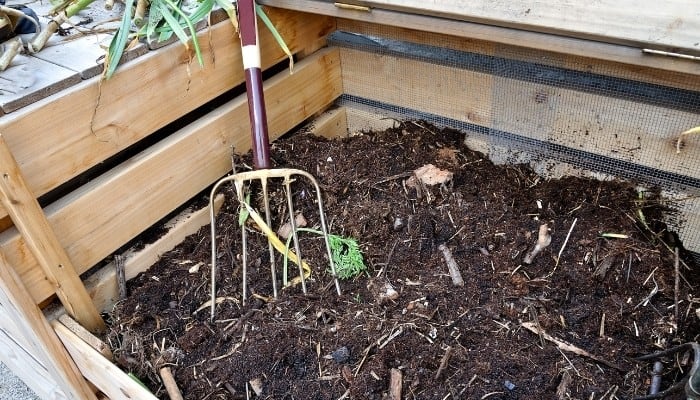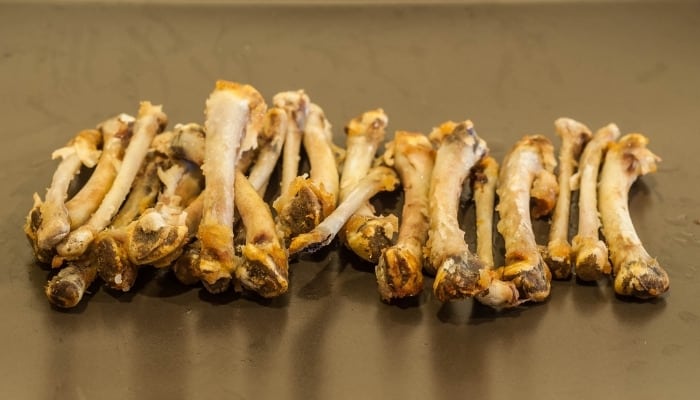It is common knowledge that many gardeners advise against adding chicken bones to your compost pile. However, this practice is not recommended.
Yet you’ve also heard great things about the beneficial nutrients in chicken bones for your soil and plants. Argh! So what’s the truth?
Can you compost chicken bones? Chicken bones can be composted, but they take longer to decompose than other organic materials. They can also leave harmful pathogens in your compost and attract pests if they are not pre-processed and composted in an effective manner, such as with hot composting or the Bokashi method.
Most kitchen scraps can be added to your compost pile with minimal effort, but chicken bones take a little extra effort. Don’t let that deter you though.
Let’s look at how appropriate mineral-rich chicken bones are for your compost pile, the best ways to compost them, and more.
Adding Chicken Bones to Your Compost – What To Know
Composting chicken bones is commonly debated because some people skip the recommended process – leading to ineffective, unsterile results.
Here’s what you need to know about chicken bones and the best composting methods.
Are Chicken Bones Compostable?
Yes, chicken bones are naturally compostable as they are organic materials.
Compared to most animals, the fine, brittle bones of chickens lend themselves well to composting, particularly chicken wing bones.
Are Chicken Bones Biodegradable?
Absolutely. Anything organic is biodegradable and chicken bones will naturally decompose whether placed in your compost pile or landfill.
Due to the calcium hardening their structure, however, they will take far longer to biodegrade compared with common composting materials.
Are Chicken Bones Good for Compost?
Yes, chicken bones are essentially a bone meal fertilizer and will enrich the compost with a hearty dose of calcium, phosphorus, nitrogen, and potassium – all the things your garden plants need in abundance.
What’s more, the structural protein in the bones (collagen) consists of amino acids, such as glycine and arginine, which break down to provide your compost pile with added oxygen, carbon, and hydrogen – feeding the decomposer microbes in your compost!

How Long Do Chicken Bones Take To Decompose?
If processed correctly before composting, chicken bones may take just two months to fully decompose. The rate of decomposition will vary, of course, depending on a few factors:
- The carcass size/volume of bones used
- How regularly you turn your compost (every 3-7 days is recommended)
- The moisture content of your compost pile
Did you know that chicken bones alone are made up of almost 60% moisture?
The Waste Management Inst. at Cornell University states that composting “proceeds best a moisture content of 40-60% by weight.”
Read this to understand more about your compost moisture levels.
Can I Put Cooked Chicken Bones in Compost?
Yes, in fact, cooked chicken bones are highly recommended over uncooked for composting as they not only break down much easier in the pile, but they are less likely to spread harmful bacteria when they are added to the pile.
You could also boil the bones, but as this can leach some of the beneficial nutrients, we’d recommend adding the boiled bone broth to your compost pile too!
Drawbacks of Composting Chicken Bones
Placing raw, unprocessed chicken bones can have its downsides, such as:
- Attracting pests & wild animals – the remnants of raw meat on the bones will draw flies, ants, and slugs to your pile as well as larger burrowing animals like rats, dogs, raccoons, and even bears.
- The spread of disease – composting raw chicken bones leads to the risk of bacterial contamination from pathogens such as E. coli (which can survive for an alarming two years in your compost!), spreading disease to your crops and potentially to local wildlife.
- Foul-smelling compost – good compost shouldn’t have a strong odor, but there’s no mistaking the stench of rotting meat, which is how your compost pile will smell with unprocessed bones that aren’t well covered.
Which Compost Methods Are Best for Composting Chicken Bones?
There are two popular methods for composting chicken bones that are preferable to regular cold composting:
Hot Compost
Hot composting uses a hot bin to optimize the moisture, microbial activity, nitrogen-to-carbon balance, and temperature of the compost for speedier decomposition.
This is made by adding repeated layers of carbon and nitrogen material at a 1:3 ratio so that a carbon layer (brown waste such as grass clippings, sawdust, paper, etc.) always remains at the top with green layers of nitrogen-based material (kitchen scraps, bones, etc.) sandwiched in the center where temperatures are hottest.
A hot compost bin reaches high enough temperatures (between 120 and 170°F) to kill off odor-causing bacteria left by improperly processed bones.
Bokashi Bucket
Taken from the Japanese term Bokashi meaning “fermented organic matter,” this especially fast composting method uses a dry mixture of wheat bran and molasses (black treacle) that is inoculated with microorganisms.
When added to your compost bin or bucket, this mix of beneficial fungi, yeasts, and other bacteria in the Bokashi ferments the food scraps (including solid bones and carcasses).
This significantly speeds up the composting process. It also helps to extinguish harmful pathogens and prevents putrefaction – keeping foul odors at bay!
How To Compost Chicken Bones
- It’s advisable to first pre-process the bones with heat. You can do this by boiling the meat off the bones for 20 minutes or cooking them in your oven or a small wood fire.
- Once cooked, the chicken carcass will be easier to break into smaller pieces. Do this using a mortar and pestle or joint secateurs designed for poultry bones.
- Lastly, ensure the chicken bone fragments are buried several inches deep within your compost pile. In the manner of the hot compost method, it’s preferable for the bones to sit between several layers of other waste material.
Related Questions:
Can I Bury Chicken Bones in the Garden?
Chicken bones can be buried in the garden, but they can take months to decompose when buried directly into garden soil.
It’s advisable to either bury the bones at least 2 feet deep and place a sheet of wire mesh over the hole to deter digging animals or speed up the bones’ decomposition by composting them first.
Can You Put Fish Bones in Compost?
Yes, fish bones can be composted. Fish bones enrich compost with calcium and break down quicker than most animal or bird bones.
Speed up the composting process by first baking the bones on a low heat until they become brittle before placing the bones into a freezer bag and crushing them into powder form with a tenderizing tool.
Conclusion
To sum up, yes, you can absolutely compost chicken bones if you follow the correct practices, and most gardeners advocate it as the bones provide much enrichment to your compost pile.
Be sure to properly prepare the bones before composting and use a fast-acting decomposing method such as hot bin composting to make the process simpler and safer.

